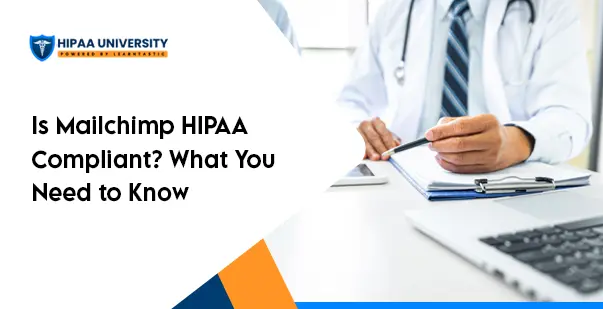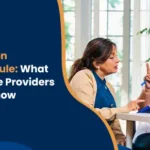Is Mailchimp HIPAA Compliant? What You Need to Know

September 2, 2024
In healthcare, and really, in any industry, data security is incredibly important. The Health Insurance Portability and Accountability Act (HIPAA) is the law responsible for ensuring that all necessary measures are followed to protect patient health information (PHI). For this reason, sticking to compliance standards is crucial when you’re using tools like Mailchimp for email marketing.
While many organizations trust and use Mailchimp for its features, HIPAA actually requires marketing tools like it to sign a Business Associate Agreement (BAA). Here’s the catch: Mailchimp doesn’t do that. So, can Mailchimp really be HIPAA compliant?
This question is a really critical one for specific healthcare organizations that are thinking about using this tool. When receiving and processing patient information, the principles of HIPAA absolutely must be followed. In this blog post, we’ll answer whether Mailchimp is HIPAA-compliant, and if not, we’ll explain why.
What is HIPAA Compliance?
HIPAA compliance basically means following the rules set by the Health Insurance Portability and Accountability Act (HIPAA). Its whole purpose is to protect people’s medical information. This involves taking specific steps to keep health information private and secure, ensuring it’s stored, handled, and shared safely. Any organization that deals with health information – like doctors, insurance companies, and even some marketing tools – simply must follow these rules to avoid legal problems and keep their clients’ trust.
HIPAA compliance applies to several kinds of entities. These include healthcare plans, healthcare providers, healthcare clearinghouses, and any business associates who handle Protected Health Information (PHI). The U.S. Department of Health and Human Services (HHS) oversees HIPAA stipulations, and the Office for Civil Rights (OCR) enforces them.
Goals of HIPAA Compliance
HIPAA compliance is essential for safeguarding sensitive health information and making sure organizations handle patient data responsibly. By sticking to HIPAA regulations, organizations don’t just protect patient privacy; they also build trust and maintain the integrity of their operations. Here are the primary goals of HIPAA compliance:
- Limit the use of Protected Health Information (PHI) to only those who truly need it.
- Impose penalties on anyone who doesn’t follow HIPAA regulations.
- Ensure the security and privacy of sensitive patient information.
Penalties for HIPAA Violations
For civil violations, individuals who unknowingly break HIPAA rules might face a $100 fine per violation. There’s an annual cap of $25,000 for repeated violations. If there’s willful neglect of HIPAA rules that isn’t corrected quickly, penalties can jump up to $50,000 per violation, with an annual maximum of $1.5 million.
Criminal Penalties for HIPAA Violations
In cases of criminal violations, covered entities that knowingly and willfully disclose identifiable health information could face monetary penalties and even imprisonment for up to one year.
🔗 Read More: What is HIPAA Certification?
Key Aspects of HIPAA Compliance
While HIPAA has a wide range of aspects, three main rules truly govern how HIPAA regulations are put into practice. These are:
HIPAA Privacy Rule
The Privacy Rule protects the privacy of individually identifiable health information. This includes medical records and other personal health information that is held and potentially shared by business associates and covered entities.
This rule specifically requires covered entities, such as healthcare providers and healthcare clearinghouses, to get written consent from individual patients before using their Protected Health Information (PHI) for purposes other than payment, treatment, and healthcare operations.
HIPAA Security Rule
The Security Rule of HIPAA works hand-in-hand with the Privacy Rule. It ensures a certain standard for protecting electronic protected health information (e-PHI). The Security Rule is applied to covered entities and their various business associates who are tasked with creating, maintaining, receiving, and transferring e-PHI. Its aim is to ensure the integrity, confidentiality, and availability of that information.
HIPAA Breach Notification Rule
The HIPAA Breach Notification Rule covers covered entities. It requires them to alert affected individuals, the Department of Health and Human Services (HHS), and sometimes even the media if there’s an infringement of unsecured PHI. Such notifications must be made without any unnecessary delay, and specifically within 60 days after the breach is discovered.
What is Mailchimp?
Mailchimp is a really popular email marketing platform. You’ll find it used across many industries, including healthcare, e-commerce, education, and nonprofits. It lets businesses and individuals easily create emails, send them out, and manage their marketing campaigns. Over time, Mailchimp has added more digital marketing tools beyond just email. Founded in 2001, it has grown into one of the top email services available today.
Email marketing offers a cost-effective way to reach a lot of people. Healthcare organizations, for instance, use Mailchimp to easily create and customize emails for their patients, manage their email lists, and personalize messages to make them more relevant to each patient.
The platform allows organizations to segment their audience based on things like age or health interests. They can also automate emails, such as appointment reminders, follow-ups, and health tips. Mailchimp even helps track the success of these email campaigns by analyzing metrics like how many people open the emails, click on links, or take action.
The platform is designed to be easy to use, even for those without extensive technical knowledge. This makes it a great option for improving patient communication and engagement.
Is Mailchimp HIPAA Compliant?
Many healthcare organizations are looking at email marketing platforms like Mailchimp to handle patient communications more efficiently. But still, healthcare professionals and administrators often find themselves wondering: is Mailchimp actually HIPAA compliant?
Getting a clear answer to this important question requires a comprehensive review of Mailchimp’s features, how it might be used in healthcare settings, and the consequences of its usage within the bounds of HIPAA guidelines. Healthcare organizations absolutely must understand these factors to maintain patient confidentiality while still trying to make the most of digital communication tools.
- Mailchimp Does Not Sign Business Associate Agreements (BAAs): HIPAA specifically requires that any service handling Protected Health Information (PHI) must sign a BAA to ensure compliance. Mailchimp, however, does not sign BAAs, meaning it doesn’t meet this critical requirement.
- Users are Responsible for Compliance: Mailchimp’s terms of service clearly state that its users are responsible for making sure they follow all applicable laws, including HIPAA. This effectively places the entire burden of compliance squarely on the user, rather than on the platform itself.
- Security Controls: While Mailchimp does offer some security features, such as encryption, these alone aren’t enough to satisfy the full requirements of HIPAA compliance without a Business Associate Agreement (BAA) already in place.
- Not Suitable for PHI: Due to the lack of a BAA, Mailchimp is simply not recommended for sending emails that contain PHI or for any activities that demand strict HIPAA compliance.
- Alternative Options: For healthcare email marketing, it’s strongly advised to use a service that explicitly supports HIPAA compliance and will sign a Business Associate Agreement (BAA). This ensures all legal requirements are met.
🔗 Read More: What Is The Purpose of HIPAA in 2024?
Risks of Using Mailchimp for Healthcare Communications
Using Mailchimp might work for general emails, but when it comes to healthcare—especially anything involving patient information—it’s a risky choice.
- It’s Not HIPAA-Compliant
HIPAA (Health Insurance Portability and Accountability Act) exists to protect patient privacy, and any platform used to share Protected Health Information (PHI) needs to follow those rules. Mailchimp doesn’t. If a healthcare provider sends patient info through Mailchimp, it could violate HIPAA and lead to fines or legal trouble. It also puts patient trust at risk. - Data Security Isn’t Built for Healthcare
While Mailchimp does have basic security, it might not be enough for healthcare data. There’s a chance of weak encryption, poor storage safeguards, or limited access controls. That opens the door to unauthorized access—and once that happens, it’s hard to undo the damage. - Privacy Could Be Compromised
Emailing patient info always comes with risks. Mailchimp isn’t built for the level of privacy healthcare requires. If someone gains access to those emails—or they’re sent to the wrong person—it could compromise confidential details and cause serious trust issues. - Mistakes Happen Easily
With bulk emails, one slip—like sending to the wrong list—can mean private information lands in the wrong inbox. In healthcare, even small errors like this can count as violations. - Consent Isn’t Built In
Informed consent is critical in healthcare. Patients need to know—and agree to—how their data is being used. Mailchimp’s default settings don’t support these stricter requirements. Without a system to get and track consent, it’s easy to run into problems. - It’s Not Meant for Sensitive Content
Mailchimp is designed for marketing, not for handling medical content. It doesn’t have tools specific to healthcare communication. That means messages could be misinterpreted or mishandled—and that’s a risk no provider should take.
Final Thoughts
The answer to whether Mailchimp can be HIPAA compliant is clear: it cannot. It simply should not be used for any digital communications, including emailing, that involve Protected Health Information (PHI). Healthcare organizations must choose alternatives specifically designed to comply with HIPAA regulations.
As a member of the public, it’s crucial to understand these regulations and your rights as a U.S. citizen. Protecting your health information is vital. To gain deeper insights into how tools like Mailchimp can potentially violate your Protected Health Information and how to safeguard your healthcare rights, consider enrolling in a HIPAA course today.





